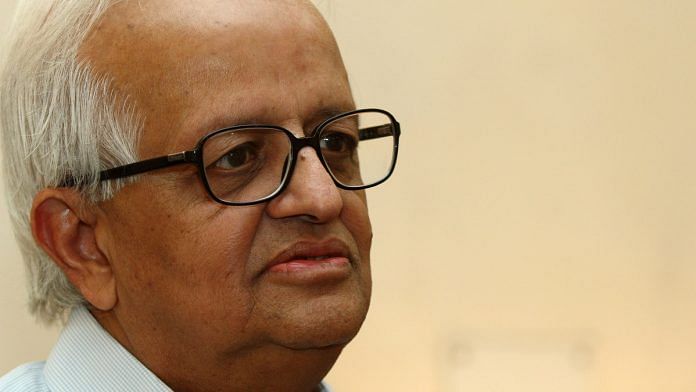New Delhi: The Bimal Jalan panel is set to recommend a transfer of the Reserve Bank of India’s surplus reserves to the government in tranches over the next three to five years, a source familiar with the deliberations said.
This means the government will not get the surplus reserves in one go to ease the fiscal pressure on it. The transfer will be based on a formula. The amount, however, could not be ascertained by ThePrint.
The recommendation comes despite differences within the panel, with Subhash Chandra Garg, Secretary, Economic Affairs, who is representing the government, expressing his disagreement.
The panel, which met for the last time Wednesday, will submit its report to the central bank sometime over the next few days. It is also likely to recommend a periodic review of the economic capital framework of the RBI every three to five years.
Why panel was set up
The Jalan panel had been constituted jointly by the Reserve Bank of India and the government to decide the level of excess reserves of the central bank, and the amount that can be transferred to the government.
While the government has been of the opinion that the contingency reserves of the central bank are more than required, the RBI had defended the need for adequate capital to take care of any exigencies.
The government was also eyeing the valuation reserves, but the RBI contended that these are unrealised gains.
After months of disagreement, the central bank and the government agreed to set up a committee to arrive at the economic capital framework of the central bank in December 2018.
However, the differences between the government and the RBI have spilled over to the panel, which delayed its report from the original April deadline by a few months.
Types of reserves
The RBI has three kinds of reserves — valuation reserves for dealing with volatility in foreign exchange holdings and government securities, asset development reserves for taking care of depreciation and other asset-related costs, and a contingency reserve to take care of any unforeseen emergencies.
As of June 2018, the total reserves of RBI exceeded Rs 9 lakh crore, with more than Rs 6.9 lakh crore in valuation reserves, according to its annual balance sheet.
Also reads: RBI rate cuts now reaching consumers in two-three months, not six, says Shaktikanta Das




After the LIC, ONGC, and other rich PSUs, the Modi government has now decided that the RBI money too belongs to it. What has it been doing with all this money? It is only a matter of time before it sets its eyes on the foreign exchange reserves too, which is 430 odd billions. Government wants to spend 100 lakh crores on infrastructure, which is about 143 billion dollars. Will it BORROW this kind of money in foreign markets, or look surreptitiously at the 430 billion foreign reserve?
By the way, in this government’s previous five years, we had heard of, 75 billions from UAE, 30 billions from Japan, 20 billions from the USA or China, I forget. Did all of that money come in? If yes, then we should have been sitting on a tidy pile of 120 odd billions! Or, may be it indeed has come to India, and that’s what is going to finance the 143 billion infra push. If not, then why not, have we reminded them or no? Is the FAX machine broken, or where is that pilot fellow, where is PM’s Air India One, has that also been put on the block? Why the hug nothing is working?
The good thing about big numbers is, none of us knows what that kind of money looks like. One hundred lac lacs is not $ 143 billion. It is actually $ 1.5 trillion. 2. To answer the query in the second paragraph, not one packet of potato crisps has come out of all those projected figures.
Hahaha, now I have forgotten how many zeroes are there in a trillion. But what you say about the second para is the confusion I have had all along. Has India’s intolerance started biting, have people written us off as a rogue state,,? Forget the foreigners, have OUR OWN capitalists secretly decided on a passive disapproval of the violent Hinduism that is being established? Why are there NO PRIVATE investments taking place in the country? All these BJP guys are good orators. But they forget one very important thing: every listener has the power to switch off! That is what I mean by passive disapproval. If there is a dog standing in front of you and you break into a half an hour spiel to prove that it’s a lamb, then you will never know that the listener, thirty seconds into the proceedings as soon as he heard your proposition, had switched you off! They can put a thousand Mukul Rohtagis and an equal number of that other fellow, I forget his name, who said that some papers were stolen and then said they were not stolen, but they will never be able to prove that Anil Ambani had any “professional” reasons to be in the thick of the things. Only “human” reasons will be found. Greed is a human reason. Poor Anil Ambani is being badgered for displaying this human trait, as if he’s the only human!
It is evident that this measure, like the bold proposal to issue sovereign bonds denominated in dollars, is no more than an effort to shore up an over stretched fisc. To pay for pure revenue expenditure like transferring five hundred rupees a month to each farm family, that adds up to almost a trillion a year. Once serious investors – domestic and foreign – form an impression that prudence in macroeconomic management is no longer in fashion, expect a rerating of India as an investment destination.